Quad-Cities Filmmakers Debut New Film On Dramatic Wisconsin vs. Amish Case Online
Public education and religious freedom have long been big issues, up to the present day. And the latest documentary from Moline-based Fourth Wall Films explores a landmark U.S. Supreme Court case relating to the Amish community.
“The Amish Incident: Wisconsin vs. Yoder,” produced by award-winning and Mid-America Emmy-nominated filmmakers Kelly and Tammy Rundle, will be presented on Tuesday, Dec. 29 at 6:30 p.m. for a special free online screening via Facebook. A Q&A session with the Rundles and Dr. Shawn Peters, author of “The Yoder Case,” will follow the film.

The Rundles at the Putnam Museum Giant Screen Theater, Davenport.
Viewers can attend the event at www.facebook.com/Fourth-Wall-Films-173844695995934.
The Amish Incident: Wisconsin vs Yoder explores the battle over education and parental rights that emerged from a small Amish community near New Glarus, Wis. The 1968 conflict began when Amish parents removed their children from public schools over a state law compelling education beyond the 8th grade.
Three Amish fathers (including Jonas Yoder) were convicted and fined for truancy violations. As a rule, the Amish do not “go to law” to resolve legal conflicts, but with help offered by an outside legal team, the subsequent trial and appeals culminated in a dramatic 1972 U.S. Supreme Court decision that defined how Wisconsin and other states facilitate education for Amish children, according to Fourth Wall Films.
The new half-hour doc is a companion piece to their 2019 “The Amish Incident: Rural Conflict & Compromise,” about a famous Iowa case from the 1960s.
The Wisconsin “Amish Incident” blends newly discovered historic photos and archival materials with on-camera interviews with Shawn Francis Peters, PhD, (The Yoder Case: Religious Freedom, Education, and Parental Rights), nationally-recognized Amish historian Mark DeWalt, PhD (Amish Education in the Unites States and Canada), and local historian Kim D. Tschudy (New Glarus: Images of America), to tell a fascinating and important true story of a monumental courtroom clash over education and religious freedom.

Kids playing at an Amish school near Evansville, Wis. Some of the New Glarus families moved there following the Supreme Court ruling.
“For me, when I’ve thought about this case, one of the reasons I really got drawn into it was, it kind of turns our understanding of landmark cases on its head,” author Peters says in the film. “We think about victory and vindication and fame and this is very complicated in a lot of ways. Part of the legacy of this case is actually what happened to the New Glarus Amish and Jonas Yoder.”
An internationally-recognized expert on religious liberty issues, Shawn Peters teaches at the University of Wisconsin-Madison, and has been featured by CNN, PBS, Court TV, Time magazine, and The New York Times.
“There are fewer protections for religious liberty. So one of the reasons Yoder is important is because it’s the moment when judicial protections for religious practice are at their height in American history,” according to Peters. “Over the years, lots of groups have pointed to the Yoder case when they’ve wanted their own protection from state regulations particularly in the areas of education and family life.”
“Several of the Amish who were involved in the Hazelton, Iowa incident moved to New Glarus to avoid conflict, only to end up in a national, precedent-setting legal case,” director Kelly Rundle said recently.
Amish trouble starting in Iowa
The first half-hour “Amish Incident” premiered in February 2019 on WQPT Quad Cities PBS. The “incident” in question centered around an iconic Nov. 19, 1965, Des Moines Register photo of Amish children fleeing into cornfields, after school officials in rural Buchanan County (north of Cedar Rapids) tried to bus them to public school.
The incident and photo ignited a firestorm of arrests, fines and controversy leading to a unique precedent-setting covenant between the “Plain People” (who now number over 17,000 in Iowa and Illinois) and the State of Iowa, according to a film synopsis.
“The Amish Incident” — which is styled as an old-fashioned paean to the importance and impact of journalism — weaves interviews with key
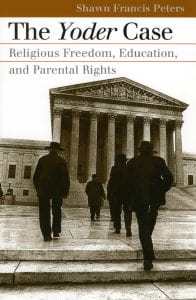
The cover for the 2003 book “The Yoder Case” by Shawn Peters.
people in the story with newly discovered archival materials and photos.
The release of the doc was timely, as one of those primary characters — Gene Raffensperger, longtime reporter/editor for the Register’s eastern Iowa bureau, based in Davenport — died in November 2018 at 89. His interviews in “The Amish Incident” were recorded in 2009, as Moline-based filmmakers Kelly and Tammy Rundle were making their “Country School: One Room — One Nation.”
The famous photo ran two straight days in the Register and was picked up across the nation, including in Life magazine. While Iowa wanted to uphold its education laws, the Amish tried to uphold values of their faith, and have their kids taught in their own schools.
A compromise was reached in 1967, where the Amish were allowed to use their own teachers; students did not have to attend past eighth grade, but they had to pass the Iowa Test of Basic Skills.
The 1972 U.S. Supreme Court decision — based on a Wisconsin case — said attempts to compel Amish students to attend school past eighth grade would be a violation of the First Amendment right to religious freedom.
The 2019 film won a Silver Eddy Award at the Cedar Rapids Independent Film Festival, and was an official selection at the Oneota Film Festival. It also received the Scholarship and Artistry Award from the Country School Association of America.
“The Amish Incident: Wisconsin vs Yoder” was funded in part by a grant from the Wisconsin Humanities, with funds from the National Endowment for the Humanities.
The Wisconsin case was related to the Iowa one from the 1960s, Kelly Rundle said recently. “The tension by 1964 was pretty significant in Iowa,” he said. “Some of those folks left Iowa and moved to New Glarus, to get away from the conflict in Iowa.”
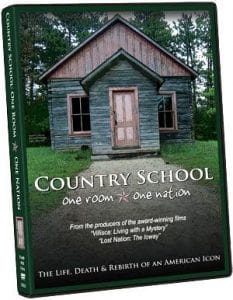
The Rundles documentary “Country School: One Room — One Nation” came out in 2010.
One of those parents that came from Iowa was part of the Supreme Court case, Adin Yutzy. The story in Wisconsin began a bit later than it started in Iowa, stemming from the same issue – the Amish didn’t want their kids to attend school past 8th grade and they wanted to control the curriculum, with their own teachers.
According to the Amish, 8th grade is a critical time for children, Rundle said.
“After they’ve received an elementary education, which is all they feel they need, the next years of their life are years that are important for two reasons,” he said. “One is, the Amish believe in learning by doing. They are to learn a trade during this time.”
“That time is regarded as crucial, because they’re learning a skill they will use for the rest of their lives,” Rundle said. “If they’re in school, they’re probably not devoting the same time and energy to learning that trade. That’s one important objection to them.”
The other has to do with the choice to be baptized and join the Amish faith, since children aren’t baptized as infants, but later as adults (at 14 or older). Parents felt things the kids are exposed to in high school may influence that decision and discourage Amish kids from staying in the faith, Rundle said.
“The Amish go out of their way to avoid conflict, but they have their convictions and they will not compromise on certain things,” he said. The kids who moved from Iowa to New Glarus kind of “aged into the problem,” since they were in grade school in Iowa.
“Public elementary school, they didn’t perceive to be as harmful as high school,” Rundle said.
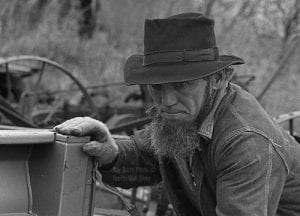
Jonas Yoder in 1969.
“The weird thing about the story is, the Amish win the case, but it brings so much attention to Jonas Yoder and the Amish community in New Glarus, that it created a controversy among the Amish themselves. So instead of drawing the community together, it split the community apart. The Amish left New Glarus.”
The number of Amish in the New Glarus area at the time of the Supreme Court case was around 100, Rundle said, noting in 1964, the initial group was around 60.
In New Glarus, when the Amish moved in, other residents were a little apprehensive, and it eventually turned into an economic boon, he said. “They became known as an Amish community and tour buses started appearing from Chicago or Milwaukee.”
The court case
Wisconsin v. Yoder, whose arguments were heard in the U.S. Supreme Court 49 years ago this month, was decided unanimously on May 15, 1972, with the court ruling Wisconsin’s compulsory school attendance law was unconstitutional as applied to the Amish (primarily members
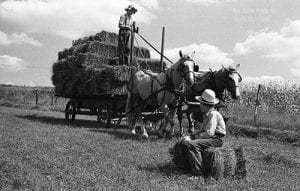
An Amish farm featured in “The Amish Incident: Wisconsin vs. Yoder.”
of the Old Order Amish Mennonite Church), because it violated their First Amendment right to free exercise of religion.
The case involved three Amish fathers—Jonas Yoder, Wallace Miller, and Adin Yutzy—who, in accordance with their religion, refused to enroll their children, aged 14 and 15, in public or private schools after they had completed the eighth grade. The state of Wisconsin required that children attend school to at least the age of 16. The fathers were found guilty of violating the law, and each was fined $5.
A trial and circuit court upheld the convictions, concluding that the state law was a “reasonable and constitutional” use of government power. The Supreme Court of Wisconsin, however, found that the application of the law to the Amish violated the First Amendment’s free exercise of religion clause, and the state appealed to the U.S. Supreme Court.
It concluded that secondary schooling would expose Amish children to attitudes and values that ran counter to their beliefs and would interfere with both their religious development and their integration into the Amish lifestyle.
“The attorney who argued on behalf of the Amish before the Supreme Court was very compelling, so much more so than the attorney for the
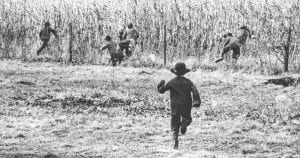
The iconic 1965 Des Moines Register photo showing Amish children fleeing after county officials tried to bus them to public school.
state of Wisconsin,” Rundle said. “He just overwhelmed the proceedings.”
Nobody in the beginning could have foreseen the New Glarus case getting national attention, he said. “It’s kind of shocking that a local dispute over gym uniforms got to the Supreme Court. It was even shocking to the Amish – who as a rule do not settle disputes in court.”
The issue with gym clothes was that Jonas Yoder felt they were not modest enough and objected his daughters having to wear the uniforms, he said.
The Amish also felt that since the children helped on their farms and walked to and from school, the idea they needed physical education was “almost laughable,” Rundle said.
“Like the Iowa compromise, it was sort of written to try and keep the judgment narrow, so it would apply only to the Amish,” Rundle said of the ruling. “I know people who are interested in homeschooling have referenced this case.”
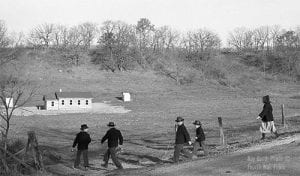
Amish children arrive at one of two Amish one-room schools near New Glarus, Wis.(1968).
Peters released his book on the Yoder case in 2003. “He examines the breadth of First Amendment protections, the validity of compulsory school attendance, and the fundamental rights of parents and children,” according to a summary. “He also takes readers deep into the world of the Old Order Amish to show how their beliefs were often at variance with the very measures being undertaken to protect them.”
While most accounts of Wisconsin v. Yoder have focused on its origins and implications, Peters “lays out all the facts of the case to reveal their intrinsic importance,” the synopsis says. “He draws on trial transcripts and in-depth interviews with participants to fully explore the backgrounds, motivations, and strategies of the people who shaped the case-particularly the National Committee for Amish Religious Freedom and its attorney William Ball.
“He then describes in riveting prose how the trial unfolded, explains the impact of First Amendment jurisprudence on ordinary citizens involved, and shows how a relatively obscure dispute became a conflict of national importance.”
Fourth Wall filming and screenings
Mark DeWalt, who wrote about Amish education, was featured in the Rundles’ “Country School” film (2010), “The Amish Incident” and the new film (all recorded in 2009). Kelly Rundle said they tried not to overlap between the two Amish docs in content and interviews.
Peters was filmed in January 2020 in Madison, Wis. The Rundles did three outdoor interviews this year for an unrelated short nature film, and interviewed the historian Kim Tschudy in a large room in the New Glarus town hall (New Glarus is 25 miles southwest of Madison), in September.

Moline-based filmmakers Tammy and Kelly Rundle have received eight regional Emmy nominations.
Like “The Amish Incident,” the Wisconsin documentary looks at its subject through the lens of journalism, Rundle said. This one was based on the work of Raymond Barth, an independent reporter/photographer in Monroe, Wis., who wrote for several papers.
“He got in early to this story, in a similar way to how Gene Raffensperger got in early on the Iowa story, and covered it from beginning to end,” Rundle said, noting they had access to lots of his photos and articles.
“There were almost 500 photographs, and I think people will be kind of amazed by the quality and the candor of his photography,” he said. “For us, working in a visual medium, it was huge to gain access to that material.”
The Rundles also did a Facebook Live Q & A for the 10th anniversary screening of “Country School” in November.
The Facebook showings give them the chance to show their films nationally (unlike local in-person screenings), and many people from coast to coast have tuned in, Kelly said. It doesn’t necessarily translate to better sales of their films.
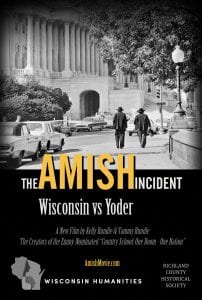
The poster for the new half-hour documentary, “The Amish Incident: Wisconsin vs. Yoder.”
“I think we have better success when we are with people in person, honestly,” he said. “That’s one reason 2020 has been tough for us, because we miss being out in front of people more. In general, sales are down. We’ve had a pretty good holiday season. Some of that comes from people being aware of online events.”
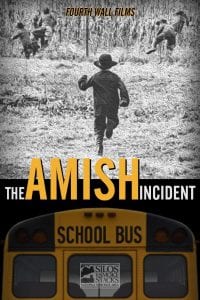
The poster for the Fourth Wall 2019 “Amish Incident” documentary.
“There are so many people competing for everyone’s dollars; if you’re not out there doing things, people don’t remember. They don’t think of you,” Rundle said.
They also showed two Hero Street films online on July 4, in conjunction with the Putnam. The first “Amish Incident” is available on DVD and video on demand through Vimeo, on www.amishmovie.com.
Today, there are more than 344,000 Amish living in the U.S. Pennsylvania has the highest population, with 81,500. Wisconsin currently has 22,235; there are 9,780 Amish in Iowa and 7,240 in Illinois.
The Rundles are producers of 12 award-winning documentaries including the “Lost Nation: The Ioway” series, “The Barn Raisers” and “Villisca: Living with a Mystery,” and have received eight regional Emmy nominations for “Becoming Harriet Beecher Stowe,” “Sons & Daughters of Thunder,” “Good Earth: Awakening the Silent City,” “River to River: Iowa’s Forgotten Highway 6,” and “Letters Home to Hero Street” (co-produced with WQPT-PBS).
Wisconsin Humanities is a leading statewide resource for librarians, teachers, museum educators and civic leaders, who drive entertaining and informative programs using history, culture and discussion to strengthen community life for everyone.
Fourth Wall Films is an independent film and video production company formerly located in Los Angeles, and now based in Moline. It focuses on telling Midwestern stories through historical documentary films that reach viewers via PBS broadcasts, theaters, film festivals, national DVD release and online streaming.
Visit FourthWallFilms.com for more information.









